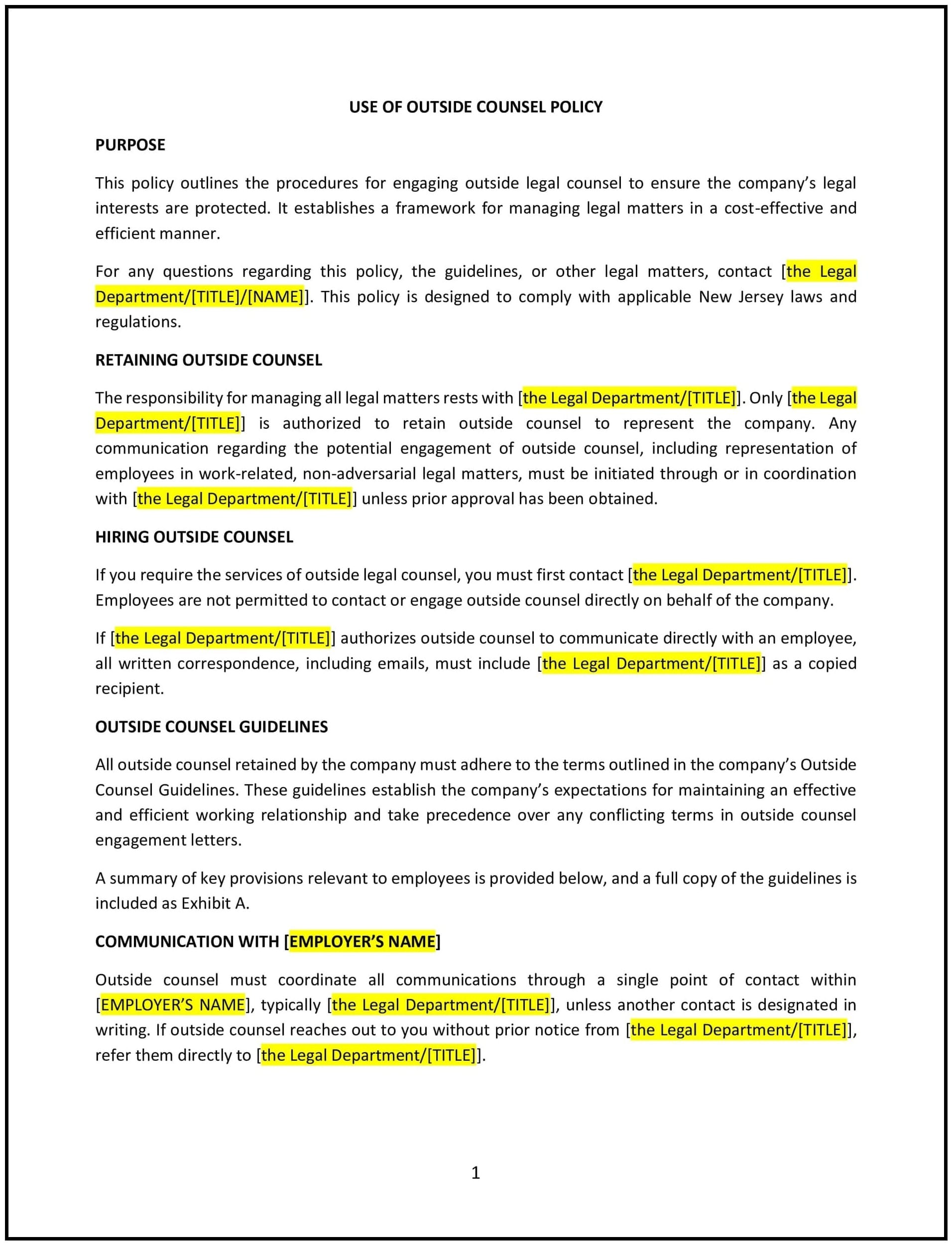Use of outside counsel policy (New Jersey): Free template
Got contracts to review? While you're here for policies, let Cobrief make contract review effortless—start your free review now.

Customize this template for free
Use of outside counsel policy (New Jersey)
A use of outside counsel policy helps New Jersey businesses establish clear guidelines for engaging and managing relationships with external legal service providers. This policy outlines the process for selecting outside counsel, setting expectations for their roles, managing costs, and ensuring compliance with the company’s legal and ethical standards.
By adopting this policy, businesses in New Jersey can ensure that their use of outside counsel is both efficient and effective, while managing legal costs and maintaining consistent quality in legal services.
How to use this use of outside counsel policy (New Jersey)
- Define when to use outside counsel: Specify the circumstances under which outside counsel should be engaged, such as for specialized legal matters, conflicts of interest, or when internal legal resources are unavailable.
- Set the selection process: Outline the procedure for selecting outside counsel, including criteria such as expertise, reputation, cost, and any required qualifications or experience relevant to the company’s needs.
- Establish cost management guidelines: Define how fees and billing arrangements will be managed, including hourly rates, flat fees, and any expectations for cost transparency.
- Define the scope of work: Provide clear guidelines on the scope of services to be provided by outside counsel, ensuring that both the business and the legal service provider are aligned on objectives and deliverables.
- Outline communication expectations: Set expectations for communication with outside counsel, such as regular updates on progress, written reports, and timely responses to inquiries.
- Address confidentiality and data protection: Emphasize the need for outside counsel to maintain confidentiality and follow company data protection policies when handling sensitive information.
- Define performance monitoring: Set procedures for evaluating the performance of outside counsel, including assessing the quality of work, adherence to deadlines, and cost-effectiveness.
- Review and update: Regularly assess the policy to ensure it aligns with New Jersey regulations, evolving business needs, and best practices in managing outside counsel relationships.
Benefits of using this use of outside counsel policy (New Jersey)
This policy provides several benefits for New Jersey businesses:
- Ensures consistency: Helps businesses maintain consistent legal practices by setting clear expectations for the use of outside counsel.
- Manages costs effectively: Provides a framework for controlling legal fees and ensuring that costs are transparent and predictable.
- Improves efficiency: Streamlines the process of engaging outside counsel, ensuring that businesses can quickly and effectively address legal needs.
- Strengthens legal strategy: Ensures that the business engages outside counsel with the appropriate expertise, leading to better outcomes in legal matters.
- Protects the business: Reduces the risk of legal issues by setting clear guidelines for confidentiality, ethical standards, and performance monitoring.
Tips for using this use of outside counsel policy (New Jersey)
- Communicate the policy clearly: Ensure that all employees, particularly those involved in engaging legal services, understand the policy and its requirements for using outside counsel.
- Establish clear communication: Regularly update employees and managers on the progress of legal matters handled by outside counsel, ensuring transparency and alignment with business goals.
- Track expenses: Implement a system for tracking legal fees and expenses to ensure that costs stay within the business’s budget and that billing is accurate.
- Review the performance of outside counsel: Regularly evaluate the performance of outside counsel, assessing factors like timeliness, quality of work, and overall value.
- Review the policy regularly: Update the policy to reflect any changes in New Jersey legal requirements, business operations, or market conditions.